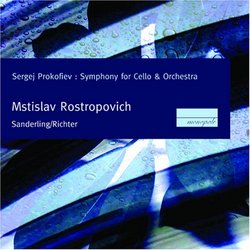| All Artists: Sergey Prokofiev, Kurt Sanderling, Leningrad Philharmonic Orchestra, Sviatoslav Richter Title: Prokofiev: Symphony for Cello & Orchestra Members Wishing: 0 Total Copies: 0 Label: Monopole Original Release Date: 1/1/2008 Re-Release Date: 9/30/2008 Album Type: Import Genre: Classical Styles: Chamber Music, Forms & Genres, Concertos, Historical Periods, Modern, 20th, & 21st Century, Instruments, Strings, Symphonies Number of Discs: 1 SwapaCD Credits: 1 UPCs: 675754010638, 7011778130229 |
Search - Sergey Prokofiev, Kurt Sanderling, Leningrad Philharmonic Orchestra :: Prokofiev: Symphony for Cello & Orchestra
 | Sergey Prokofiev, Kurt Sanderling, Leningrad Philharmonic Orchestra Prokofiev: Symphony for Cello & Orchestra Genre: Classical
|
Larger Image |
CD Details |
CD ReviewsANOTHER SIDE TO PROKOFIEV DAVID BRYSON | Glossop Derbyshire England | 04/11/2010 (5 out of 5 stars) "Unless you already own these recordings under some other label, may I urge you strongly to do what it takes to obtain this disc. I don't recall seeing the Monopole logo before, but there seem to be a few copies of this issue lurking shyly here and there, and at attractive prices. In one sense the Monopole production is fairly basic. There is a liner, but all it contains is a few pictures of Prokofiev and Rostropovich, plus one postage-stamp sized snap of Richter in a proletarian-looking cap. It could not be said of any of these great musicians, I suppose, that his face was his fortune. However something else was, and it is something to treasure here.
The two works occupying this disc make a very good pairing. They bring us the introvert and meditative Prokofiev, and the style of the instrumental writing is predominantly cantabile. The `symphony' (aka sinfonia concertante) is in three movements like a classical concerto, although with the fastest movement in the middle. I don't know why the title was chosen, but it could well be because the solo part is not particularly virtuoso in character. However this symphony is not in the least like Prokofiev's regular symphonies, especially not like the `core' series nos 2-6, where the idiom is famously strident and assertive. This sounds a late work, something that the high opus number would appear to confirm. The cantabile here is not lyrical in the 19th century sense of the term, whereas in the sonata that follows the style comes closer to that. Here Rostropovich is partnered by Richter, and that alone should recommend the performance, but one thing that should be criticised is the balance, with the cello too dominant. This recording, and that of the cello symphony also come to that, dates from the 1950's, and in the 1950's that was the way things were done. It is less of an issue in a concerto or concerto-equivalent, I suppose, than in a duo sonata, and it has one consequence that I regret in particular, given who the pianist is. When Richter participated in this recording in 1956 he was 40 and at the height of his powers. At such a date one ought to be able to identify him within seconds, but as he is balanced here I can't. To hear what I mean, try for instance the Fischer-Dieskau set of Brahms's Magalone Lieder with Richter at the piano. You will say `Richter' after a few notes, and in a recording from 1956 you should always be able to say that. I just hope this is entirely a matter of the date, and not the result of the way Rostropovich conducted his duo recordings. I say this because there is the same phenomenon with his much later set of the Brahms cello sonatas with Serkin, whose touch should be instantly recognisable at any date. Hopefully it is just a coincidence, and a much more pleasant coincidence is the strong suggestion of Brahms in the last movement of the sonata. The melody is not Brahmsian, the resemblance is just a matter of the tone, expression and instrumental writing, and all the better for that. The recordings were remastered in 2008, and the job seems to me well done. I have expressed a few reservations about 1950's recording practices, but when it comes to the sort of performances that I have here the reservations don't count for much. This, for me, is the soul of Prokofiev, the hidden spirit that all his ostensible changes of idiom could not altogether suppress or extinguish. Without disrespect to many distinguished later interpreters, there is something here that is no longer recoverable because the era of these interpretations is gone, one hopes fervently, beyond recovery." |

 Track Listings (6) - Disc #1
Track Listings (6) - Disc #1